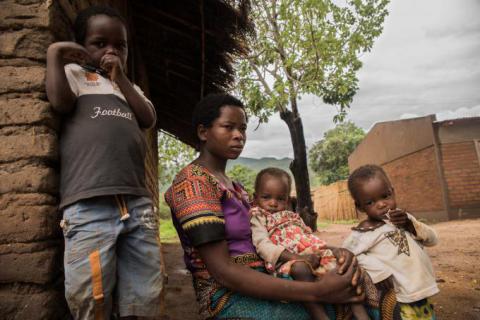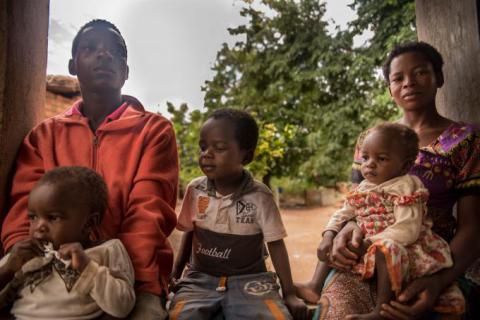Hanging by a Thread
They may be from the same household, but compared to their older brother, Musa’s twin sisters Hanifa and Hajira started their lives a world apart. Just shy of 2 years, the twin girls have spent their first 22 months in a condition that no child should have to endure. Since birth, they have not had proper diets, and today – are on the brink of being severely malnourished.
Born in March 2015, the twins came in at a difficult time for their family as well as for the nation of Malawi when the country was barely recovering from the worst floods to hit it for decades.
The month is also the start of the harvest period, that has in the recent past been characterized by adequate and at times, fruitful yields for Malawians. The twins however, were spending their first birthday this year in much different circumstances.
The harvest last year was catastrophic because of dry spells and a late onset of rain in the growing season which had resulted in what some are calling the worst humanitarian crisis to ever hit Malawi. Up to 6.5 million people, including 3 million children do not have enough food until this year’s harvest.
There hasn’t been a more difficult period in the lives of the young parents, Jafali [24] and Rokia [22] who have been married for 6 years now. They live in Zomba district, one of seven districts Save the Children is implementing its European Commission Directorate General for Humanitarian Aid and Civil Protection (ECHO) funded, ReLiEF project that looks to mitigate the effects of food insecurity among the most vulnerable families affected by the El Niño phenomenon in Malawi.
“We had Musa in early 2010. His first few years growing up were different from his younger sisters – you can just tell by their physical appearance,” explained Jafali, seated on the verandah with his family.

As the girls were anxiously reaching for their mother’s chest to breastfeed, she went on to add, “We had no problems feeding Musa, but now, I am forced to have just one meal a day or go without eating at times so we have enough to feed the kids.”
Rokia’s inadequate diet hardly provides the twins with enough nutrients when they breastfeed. Neither does their homemade baby porridge, which is made of only maize flour and water. Just a few years ago when things were better, the parents would put peanuts and other nutrient rich foods in there. Nowadays, the labour dependent father can hardly find any farms to do piecework on – therefore buying complementary food like peanuts is a luxury and hence, not affordable. To make matters worse, the family’s home garden where they also grow a variety of crops hardly produced anything last year because of the drought.
With the twins sustaining a poor diet, it did not take long for them to fall ill. In their first year, they became more susceptible to infections, frequently started to experience diarrhea and began to lose weight. Their behavior even changed.
“Hanifa especially was a lot more energetic, but these days she just sits quietly,” said her father as Hanifa curiously gave the visiting guests a fatigued gaze.
Bruce Phiri, a humanitarian aid worker from Save the Children explained that along with cash transfers or food aid, the organization’s humanitarian response links families to randomized growth monitoring screenings done by Health Surveillance Assistants (HSAs). These are mobile Government clinicians who operate in remote communities.
“The family received a cash transfer last month, where the twin girls also got weighed at a growth monitoring scale and were quickly referred to a nutrition rehabilitation unit at a district hospital,” explained Bruce.
Hanifa and Hajira are alive today, thanks to Save the Children’s humanitarian intervention.

Having received several monthly cash transfers, parents Jafali and Rokia are now at least able to stabilize their food uncertainties and treat their vulnerable twin girls. This safeguard will support the family until the humanitarian project ends in April 2017.
When asked whether this help he was getting would be enough to carry him through to the next harvest, Jafali humbly appreciated the support, but feared for what’s to come.
“With these uncertain weather patterns, not only am I concerned about my family, but for other families as well. I truly hope Save the Children will be there to see us through if our suffering continues,” sincerely pleaded Jafali.
Written by Luzayo Nyirongo, Communications Coordinator
 Malawi
Malawi